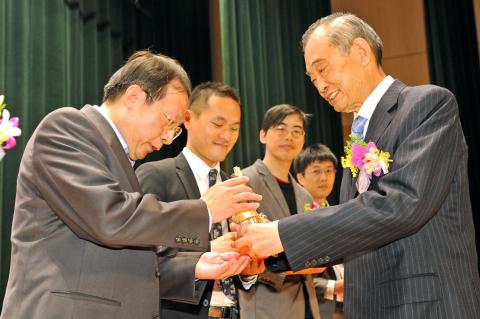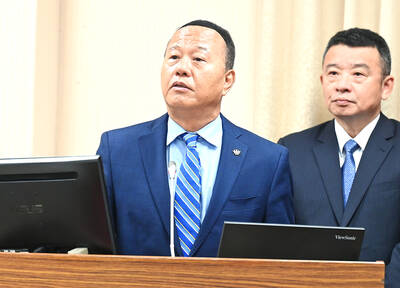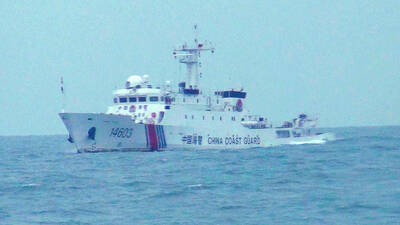“He views running newspapers as a conscientious enterprise,” journalism professor Cheng Jim-ming (鄭貞銘) said about Rong San Lin (林榮三), founder of the Taipei Times and its sister newspaper, the Chinese-language Liberty Times, in his book titled A Century of Journalists.
Throughout his life, Lin had always stood by this credo, leading his employees by example.
Lin died yesterday afternoon of a tumor-induced cardiopulmonary failure. He was 76 years old.

Photo: Sean Chao, Taipei Times
Lin’s contributions to the Liberty Times not only helped to transform it from a local newspaper with a readership based in Taichung to a newspaper with the largest circulation in the nation, but also shaped it into one of the most influential newspapers in Taiwan.
During the Liberty Times’ formative years, Lin had often told his employees that running a newspaper is a resource-intensive business that requires capital and a large pool of talent, and that he would provide all necessary support to produce a newspaper capable of reflecting the opinions of all 23 million Taiwanese.
The Liberty Times has gone through every phase of journalism, including television news to the rise of Internet news, and Lin was a key figure for the newspaper for every challenge it met.

To live up to the goal of being the “voice of Taiwanese,” he often reminded his employees to demonstrate journalistic professionalism; pay attention to every detail from newswriting to printing; and value their work ethics by approaching news reporting with an objective and unbiased attitude.
In addition to providing readers with fresh and unique perspectives on politics, democracy and economic development, Lin was also deeply concerned about the nation’s struggle for international space and media coverage, which was why he founded the Taipei Times.
The Taipei Times is a key component of the Liberty Times Group and — through many years of hard work and cultivation — has not only become the central news outlet for foreigners visiting or living in Taiwan, but also an important guide for policymakers in Washington, Tokyo and elsewhere to current affairs in Taiwan.
With a vision of promoting the nation’s democracy, freedom and restraint from the pursuit of political gain and partisan politics, Lin made consistent and profound contributions to the news industry.
As to Cheng’s lauding him as the most prominent figure of the 20th century in the nation’s news industry, Lin simply responded by saying: “It [news reporting] is an important task,” and told his employees to “keep up [their] good work.”
His words of encouragement are likely to be remembered by all of the staff at the Liberty Times Group.
Meanwhile, politicians from across the political spectrum yesterday expressed their condolences, including Legislative Speaker Wang Jin-pyng (王金平), who, reminiscing on his time with Lin on the legislature’s Finance Committee, said Lin, with his tenures as legislator, Control Yuan vice president and Liberty Times Group founder, has earned his place in history.
“Lin was a man of unbending character,” Wang said. “He could make a success of any career, as long as he put his mind to it, and he had a happy family. I envy him.”
Chinese Nationalist Party (KMT) Chairman Eric Chu (朱立倫) and the Democratic Progressive Party (DPP) also expressed their “deepest condolences.”
Chu praised Lin for his contributions to the nation and the public, adding that the Liberty Times has been a strong force in the nation’s development.
“The Liberty Times that Mr Lin founded has become the most important platform for Taiwanese culture and values of democracy, which contributes greatly to promoting the freedom of the press, deepening of democracy in Taiwan and freedom of expression,” DPP spokesperson Wang Min-sheng (王閔生) said in a statement.
People First Party Chairman James Soong (宋楚瑜) said Lin came from a working-class background, starting his working life moving bricks, but managed to develop an illustrious career with his diligence and perseverance.
Soong added that although he and Lin had their differences, he has great admiration for Lin for his love of the nation.
“I would like to express my deepest condolences to Lin’s family,” Soong said.
Additional reporting by Chen Shan-jung, Lin Liang-sheng and Loa Iok-sin

An increase in Taiwanese boats using China-made automatic identification systems (AIS) could confuse coast guards patrolling waters off Taiwan’s southwest coast and become a loophole in the national security system, sources familiar with the matter said yesterday. Taiwan ADIZ, a Facebook page created by enthusiasts who monitor Chinese military activities in airspace and waters off Taiwan’s southwest coast, on Saturday identified what seemed to be a Chinese cargo container ship near Penghu County. The Coast Guard Administration went to the location after receiving the tip and found that it was a Taiwanese yacht, which had a Chinese AIS installed. Similar instances had also

GOOD DIPLOMACY: The KMT has maintained close contact with representative offices in Taiwan and had extended an invitation to Russia as well, the KMT said The Chinese Nationalist Party (KMT) would “appropriately handle” the fallout from an invitation it had extended to Russia’s representative to Taipei to attend its international banquet last month, KMT Chairman Eric Chu (朱立倫) said yesterday. US and EU representatives in Taiwan boycotted the event, and only later agreed to attend after the KMT rescinded its invitation to the Russian representative. The KMT has maintained long-term close contact with all representative offices and embassies in Taiwan, and had extended the invitation as a practice of good diplomacy, Chu said. “Some EU countries have expressed their opinions of Russia, and the KMT respects that,” he

VIGILANCE: The military is paying close attention to actions that might damage peace and stability in the region, the deputy minister of national defense said The People’s Republic of China (PRC) might consider initiating a hack on Taiwanese networks on May 20, the day of the inauguration ceremony of president-elect William Lai (賴清德), sources familiar with cross-strait issues said. While US Secretary of State Anthony Blinken’s statement of the US expectation “that all sides will conduct themselves with restraint and prudence in the period ahead” would prevent military actions by China, Beijing could still try to sabotage Taiwan’s inauguration ceremony, the source said. China might gain access to the video screens outside of the Presidential Office Building and display embarrassing messages from Beijing, such as congratulating Lai

Four China Coast Guard ships briefly sailed through prohibited waters near Kinmen County, Taipei said, urging Beijing to stop actions that endanger navigation safety. The Chinese ships entered waters south of Kinmen, 5km from the Chinese city of Xiamen, at about 3:30pm on Monday, the Coast Guard Administration said in a statement later the same day. The ships “sailed out of our prohibited and restricted waters” about an hour later, the agency said, urging Beijing to immediately stop “behavior that endangers navigation safety.” Ministry of National Defense spokesman Sun Li-fang (孫立方) yesterday told reporters that Taiwan would boost support to the Coast Guard